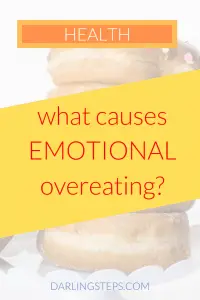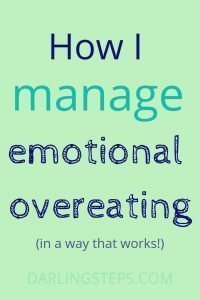What Causes Emotional Overeating Disorder?
Emotional overeating disorders can be difficult and devastating for those who suffer from them. What makes this happen? Why is it that some people, knowingly or unknowingly, turn to food for comfort? Here are some thoughts on those questions. Emotional overeating disorder is a general term that refers to any of various eating habits where genuine hunger is not the motivational factor.

It’s more common among women than men, but men are not immune – especially young men in their teens and twenties. Those who suffer from this disorder associate food with emotional comfort, and will turn to eating to escape negative feelings.
Past Trauma
For some with emotional overeating disorder, the problem stems from past traumatic events. Someone who suffered sexual abuse, for example, or some other kind of sexual trauma may overeat in response to feelings of anxiety and confusion. The result is a fatter body, which some sources suggest may cause the sufferer to feel “protected” from being attractive to the opposite sex. Subconsciously or consciously, the sufferer wants to be unattractive. Other examples of past trauma or unmet needs may cause a person to turn to emotional overeating. Have you noticed this within yourself? Or someone you know? When I first learned this, it was a lightbulb moment.
During my younger years (I feel so old writing it that way) I was abused. And I’ve struggled with emotional eating for what feels like my whole damn life. I’d never connected those dots. Maybe you haven’t either. There’s no rulebook on what this looks like. And if you’re like me, maybe you’ve never looked overweight (keyword look, as many women, especially Latinas can be technically overweight and look amazing) so you think this doesn’t apply to you. Well, let me tell you that that isn’t true.
I also remember changing my personal style, in an attempt to hide my body. But mostly I ate. I ate ice cream and carbs and then some more. It’s so easy to find comfort in food, isn’t it? It’s delicious, comforting and doesn’t even tell you-you’re well. A well-made meal, dessert or snack will welcome being eaten. As it looks so beautifully prepared ready to make your taste buds dance.
Poor Self-Image
People who suffer from low self-esteem and a negative self-image may seek escape by overeating. In a way, emotional overeating is a physical expression of what the sufferer feels inside, and the resulting weight projects the same image of self-disrespect. Ugh. You know this feeling too don’t you? Tell me I’m not alone. You staring at -said- food item and its just staring right back. Tempting you. Laughing. A battle you know you won’t win. So, hell you eat it because you look feel like crap anyway. Gosh, I hate this feeling. Being stuck. Feeling defeated. But you can overcome this. I’ve come such a long way and so can you. Keep reading.
Self-Medication
Like alcoholics, those who struggle with emotional overeating may be unconsciously using food as a drug. Eating numbs the emotions that feel be too hard to deal with otherwise. Sigh. Guilty.

- Identify the emotion(s) you’re feeling
- Write it down
- Figure out the source. Why are you feeling this way? What’s the experience causing it?
- Write down everything that can go bad
- Then write down everything that can go well
- Finally, make some tea, coffee or chew peppermint (I find it suppresses hunger) & LIG IT. #letitgo

Depression
Studies indicate a strong correlation between depression and emotional overeating. Ironically, sometimes as depression grows worse a sufferer loses weight; weight loss means the sufferer is not eating as much, and therefore not engaging in his or her coping mechanism. If you’re feeling depressed, obviously I recommend professional help. Seek your people. Those close to you. Ones you love. As comforting as eating can be. Trust me, I know. I know.

Stress
Prolonged, unrelieved stress can have a profound effect on the body. Stress stimulates the body to produce, among other chemicals, the hormone cortisol. Cortisol apparently has a hunger-stimulating effect, and as the stressful emotions increase along with the cortisol, a cycle of emotional eating can play out. Find your stressors! I can’t stress this enough. Once you find them, work through the exercise above and work on shifting your mindset.
Individual Triggers
There are triggers or causes of emotional overeating that are not necessarily in the categories above. Some examples might be:
* Boredom
* Oral need or a need to satisfy your mouth’s need to do something
* Social pressure or embarrassment at eating in public, resulting in overeating in private
* Financial stress
* Relationship difficulties
Did you discover any aha! moments?


PIN FOR LATER>>>
